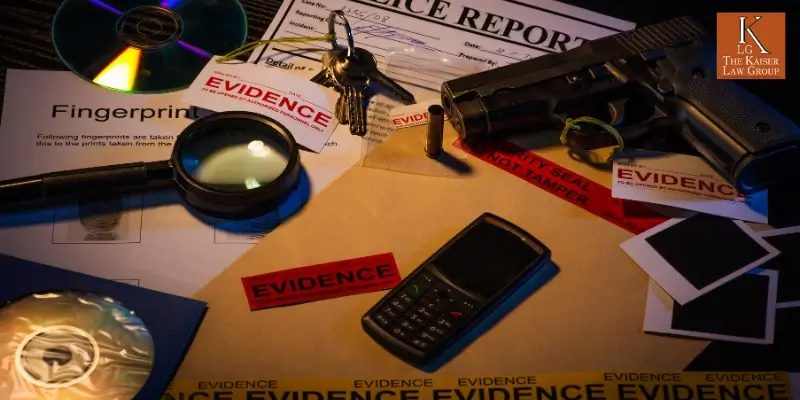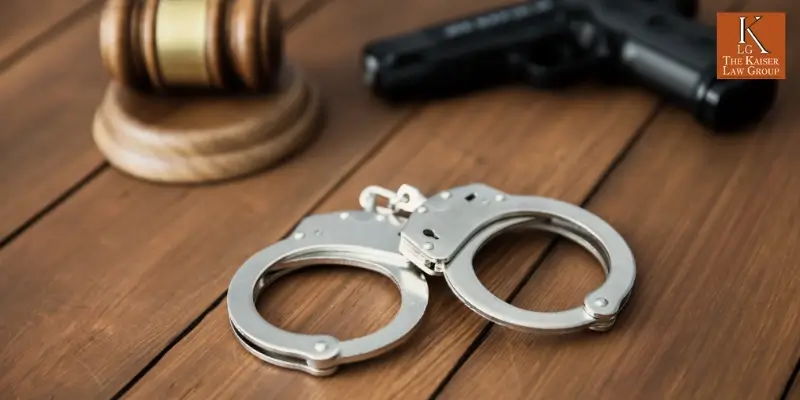Flagstaff Gun Crime Lawyer
Flagstaff Gun Crime Attorney
The state of Arizona has some of the more lenient weapons laws in the country with regard to possession and access to firearms. However, if you break those laws, the consequences can be severe. The severity of the penalties tied to a weapons-related offense depends on the charge and whether aggravating conditions apply. Arizona laws define weapons as either deadly or prohibited. If you were charged with a weapons or firearms criminal charge, you can hire a Flagstaff gun crime lawyer to defend your rights.

Firearms-Related Criminal Offenses in Arizona
Unlawful possession of a firearm or illegal use of a firearm or weapon in Flagstaff can lead to criminal charges ranging from a misdemeanor to a felony. Four of the more common weapons offenses include:
- Disorderly conduct with a weapon
- Unlawful discharge of a gun
- Misconduct involving a weapon
- Aggravated assault involving a deadly weapon
Misconduct Involving a Weapon
The charge of misconduct involving a weapon is a broad term that covers several criminal acts. Failing to disclose that you have a deadly weapon to a police officer is one type of offense under this group of laws. Possessing a deadly weapon with the intention of committing an act of terrorism is another charge related to misconduct involving a weapon. Giving or selling a deadly weapon to someone who is prohibited from possessing that weapon can also land you with a criminal charge of misconduct involving a weapon.
Because there are several types of actions that can be charged as Misconduct Involving a Weapon, the severity of charge under this group of laws ranges from misdemeanors to felonies. The potential criminal penalties include alternative sentencing all the way to years in prison.
Disorderly Conduct With A Weapon
Any behavior that disturbs the peace or causes public alarm is considered disorderly conduct in Arizona. The presence of a deadly weapon can lead to harsher charges and stronger penalties. Disorderly conduct with a firearm is a Class 6 felony in Arizona. A conviction can lead to fines, probation, and even prison time, depending on the facts of the case.
Unlawful Discharge of a Firearm
No one is lawfully allowed to discharge their firearm within a municipality or to fire their gun toward a municipality. Doing so can result in a criminal charge of unlawful discharge of a firearm. This action, charged as a Class 6 felony, can lead to fines and/ or prison time.
Aggravated Assault With A Deadly Weapon
One of the most serious crimes in Arizona is aggravated assault with a deadly weapon. Anyone who uses a deadly weapon to physically harm someone can face a Class 3 felony charge. The offense is a violent crime in Arizona, meaning that the conviction will remain on your record even after your probation or prison time has been served. A Class 3 felony carries a minimum sentence of two years.
What Are My Gun Rights in Flagstaff?
Arizona has some of the more lax gun laws in the country. Anyone 21 or over who is not prohibited from possessing a gun can carry a weapon without the need for a license. Anyone who carries a gun without a license must acknowledge if they possess a gun when asked by a law enforcement officer.
Arizona’s self-defense laws allow for the use of deadly force when justified. The use of force must be necessary to protect oneself or others from harm. If you believe that you face serious physical injury or death due to actions someone is about to take against you, you can use physical force or deadly force for your protection. If your use of force is disproportionate or excessive, you may not be protected under Arizona’s self-defense laws.
What Is a Prohibited Possessor?
Certain people who are designated as prohibited possessors cannot own or possess certain types of weapons (often firearms). The individuals may have their right to possess a firearm suspended for a period of time, or they may have their right to own or possess a firearm revoked permanently, depending on the reason for being listed as a prohibited possessor. Arizona residents may be placed on this list if they:
- Are considered to be a danger to themselves and others.
- Were convicted of a felony that bars them from carrying a firearm under federal law.
- Are serving probation for a domestic violence charge or any criminal charge that prohibits possession of a firearm
- Are an undocumented alien
- Individuals who are deemed not to be mentally competent
If your probation terms prohibit you from possessing a firearm, your attorney can help you reinstate your right to possess or own a gun once your probation is complete.
What Weapons Are Prohibited Under State Law?
Some of the prohibited weapons in Arizona come as no surprise. No one is allowed to carry or possess explosive devices like grenades, bombs, rockets, or poisonous gas. A type of silencer is also prohibited in Arizona. There are also state restrictions on the length of shotgun barrels. Other prohibited weapons include:
- Explosive mines
- Automatic rifles
- Certain combinations of chemicals
- Improvised explosive devices
- Molotov cocktails
Possession of a banned or prohibited weapon can lead to a felony charge and severe criminal consequences if you are convicted. There are legal defenses for any weapons charge that may potentially lower the criminal charge and penalties tied to the offense.
Possible Legal Defenses to Weapon Charges in Arizona
Whether you believe you are innocent of the crime you are charged with or shouldn’t face steep penalties due to mitigating circumstances, hiring an experienced criminal law attorney can improve the chances of a favorable outcome in your case. In fact, hiring an attorney should be one of the first steps you take after you are charged with a weapons crime, as the consequences of a conviction could be life-altering.
If the facts show that you are innocent, your lawyer will work to have your case dismissed. Common defense strategies include arguing that you are authorized to carry the weapon in question or that your official duties require that you carry a firearm.
- Authorized Weapon Carrier. Even authorized weapons carriers can be charged with illegally possessing a deadly weapon in this state. Business people who trade and sell guns are often caught up in this type of misunderstanding. Although the task may be tedious, you will have to show the courts that you are an authorized carrier. Your defense attorney can help you collect relevant documents to show that you legally possess the weapons in question. Authorized weapons dealers have the same rights as law-abiding citizens over the age of 21 to own or possess a gun.
- Performing Official Duties. Undercover cops, members of the military, and other law enforcement officials wear civilian clothing while performing official duties. Unfortunately, these peace officers can be mistaken for unauthorized weapons carriers. If the misunderstanding cannot be cleared at the moment of detainment, the law enforcement official or member of the military may have to clear the matter up in court.
- Illegal Search and Seizure. Everyone in this country enjoys protection from unlawful search and seizure. An experienced criminal defense attorney will understand the Fifth Amendment ramifications for this area of law. For example, law enforcement officials must acquire a warrant from a judge before searching someone’s home. If there was no warrant, the courts may dismiss your case because the evidence was collected in an unlawful manner. Any evidence that is removed from your case will weaken the prosecutor’s case, and they may choose to drop the charges or greatly reduce the charge you are facing.

Firearms Defense FAQs
How Hard Is it to Get Gun Rights Restored in Arizona?
If your gun rights were temporarily suspended while you served out probation or before your criminal case was settled, you can apply to have your gun rights restored. You must provide documentation, such as proof of completion of probation, before a judge will restore your rights. A Flagstaff, Arizona, defense attorney can take care of the paperwork on your behalf. If you were charged with a felony as a juvenile, you can apply to restore your right to possess a firearm.
When Can You Defend Yourself With a Gun in Arizona?
You can defend yourself using a gun if you face imminent and serious harm. You can use proportional force to defend both yourself and those around you. If you respond with disproportionate force, Arizona’s self-defense laws may not protect you. Your right to use force includes the use of deadly force. Unfortunately, someone who appropriately uses deadly force to defend themselves may still face criminal charges if prosecutors decide to bring charges.
What Are the Potential Charges for Gun Crimes in Arizona?
The charges for different types of gun crimes in Arizona range from misdemeanors to felonies. Lower charges for carrying a weapon into a polling place or school grounds can lead to a misdemeanor. Selling a firearm to a prohibited possessor or defacing a deadly weapon can lead to a Class 6 felony. More serious felony charges are reserved for manufacturing prohibited weapons, supplying weapons for the purpose of committing crimes, and aggravated assault with a weapon.
What Disqualifies You From Owning a Gun in Arizona?
Federal laws disqualify certain individuals from owning a gun in Arizona. Since federal laws supersede state laws, anyone who has a felony conviction cannot own a gun. Federal laws also disqualify individuals with certain domestic violence convictions from owning any type of gun. Violating these laws could result in a felony charge.
Schedule Your Arizona Gun Crime Consultation Today
An estimated 43% of adult Arizonans own at least one gun. Firearms are used by Flagstaff residents for several reasons, including sports, recreation, hunting, and self-defense. Although handguns, rifles, and small arms are commonplace in this state, anyone charged with a gun crime can face serious penalties.
Your Flagstaff criminal defense lawyer can protect your rights and develop a legal strategy that works to lower your charges and the potential penalties you are facing. If the evidence shows that you did not commit the crime you are charged with, your lawyer will work to have the charges dropped. Contact The Kaiser Law Group today to schedule your consultation.

